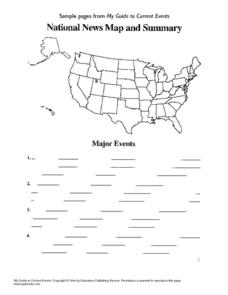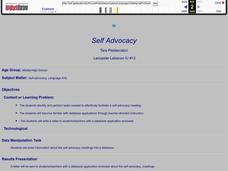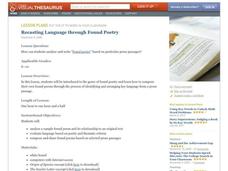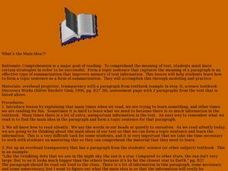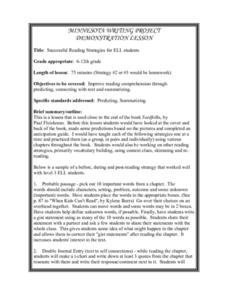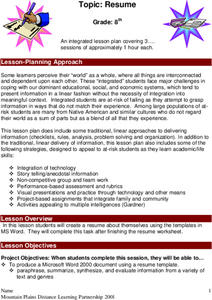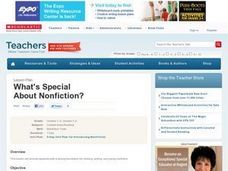cordovla.weebly.com
Summarizing, Paraphrasing and Quoting
How skilled are your class members at summarizing, paraphrasing, and quoting from a text? Find out with this assessment that asks readers to identify the thesis statement, the summary, the paraphrases, and the quoted material in an...
Ontario
Reading Informational Text
Learning to recognize the importance of the features of information text (i.e., titles, subtitles, endnotes, sidebars, etc.) is the focus of a reading activity designed for middle schoolers. Learners examine how these text features help...
Curated OER
Literary Analysis: Summary vs. Analysis
What is the difference between summary writing and literary analysis? A 16-slide presentation offers some basic requirements for both types of writing and helps readers identify each based on keywords used in both types of writing....
Curated OER
Review of a Novel Project
This review of a novel project is a great way to ensure accountability for independent reading. The assignment sheet, templates, samples, and rubrics are all part of the packet materials.
Educators Publishing Service
My Guide to Current Events
Keep your youngsters abreast of current events with these activity worksheets! Or, consider what historical events throughout early American history would have looked like on a national newspaper? Your young historians will become...
Curated OER
8.SP.1Texting and Grades I
Here is a fitting question for middle schoolers to consider: Is there a relationship between grade point average and frequency of sending texts? Starting statisticians examine a scatter plot and discuss any patterns seen.
Curated OER
Self Advocacy
Students determine the procedures for facilitate a self-advocacy meeting. They enter information about the meetings in a database which they include in a letter summarizes the meeting.
Curated OER
Nonfiction Genre Mini-Unit: Persuasive Writing
Should primary graders have their own computers? Should animals be kept in captivity? Young writers learn how to develop and support a claim in this short unit on persuasive writing.
Curated OER
Recasting Language through Found Poetry
Discover the concept of found poetry in this engaging lesson. Secondary students will explore the poem "Natural Selection" and compare it to the writings of Charles Darwin in Origin of the Species. Students chose a text and create...
Polk County Public Schools
Suffragists
The Women's Rights movement is the focus of an engaging and collaborative exercise, in which young historians use information found in textbooks, class notes, and the provided documents to craft a DBQ essay.
Curated OER
What is The Main Idea
Students will investigate why comprehension is a major goal of reading. To comprehend the meaning of text, students must know certain strategies in order to be successful. Form a topic sentence that captures the meaning of a paragraph...
Curated OER
Successful Reading Strategies for ELL Students
Students improve their reading comprehension through predicting, connecting with text and summarizing. Students should have already read the book Seedfolks and made predictions based upon what they had seen from the cover and pictures...
Curated OER
Resume
Students create a resume for themselves using a Microsoft Word template. Students view and evaluate sample resumes and complete a worksheet to determine the information they should include in the resume they complete for themselves.
Curated OER
Mini-Lesson Planning for Inferences
Making inferences and drawing conclusions is a key component to successful active reading. Encourage your class to use context clues and prior knowledge to infer different elements of a story, including the setting, plot, and character...
Curated OER
What's Special About Nonfiction?
Students examine the difference between nonfiction and fictional writing. They identify the characteristics of nonfiction literature and examine how a nonfiction textbook organizes information.
Curated OER
Discussion Director
In this discussion activity worksheet, students read the descriptions of several individual roles for book discussion groups. Students then complete specific activities based on the role they take.
Curated OER
Make a Switch: Let There Be Light
Students research a notable painter and use his or her work as inspiration to create a functional light switch plate. In this art lesson, students find an artist whose work is appealing to them to research and critique. Students then...
Curated OER
Collaborative Book Club Groups
Students participate in book club forums where they write descriptive, evaluation, analysis, synthesis, or inference essays. They take on the role of a character in their bok and publish a web page.






